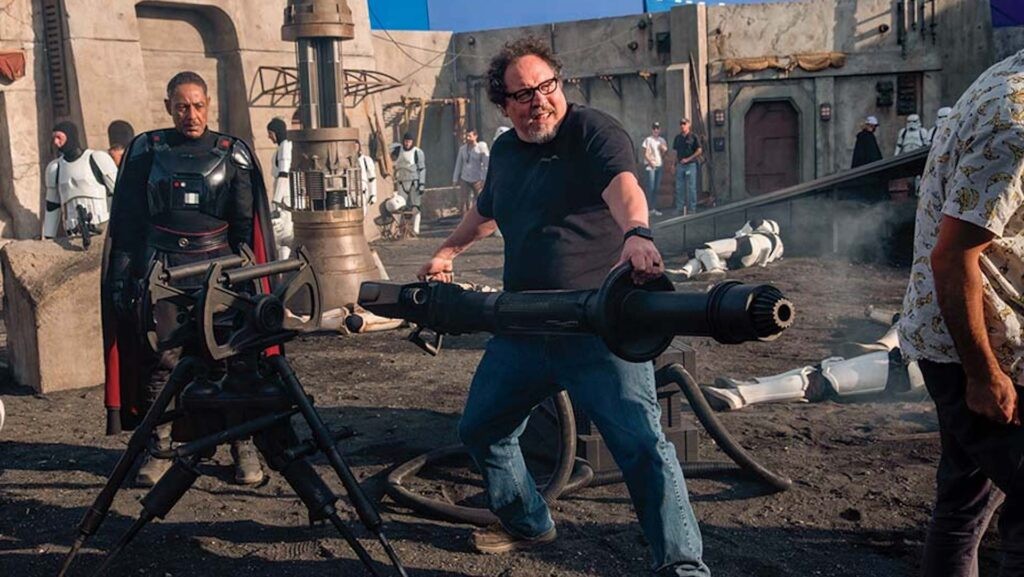Are you curious about what a showrunner is? This guide from WHAT.EDU.VN breaks down the role, responsibilities, and path to becoming one. Learn about executive producers, writers, directors, and more. Unlock expert insights into the television industry and get your questions answered today.
1. Understanding The Showrunner Role: An Overview
The showrunner is the linchpin of any television series. But what does a showrunner actually do? They’re essentially the CEO of a TV show, overseeing every aspect from pre-production to post-production. The showrunner’s duties encompass creative, managerial, and logistical tasks.
Think of them as the captain of a ship, steering the creative vision while ensuring the ship stays on course and within budget. This multifaceted role requires a unique blend of creative talent, leadership skills, and managerial acumen. Let’s dive into the specifics.
2. Defining The Showrunner: More Than Just A Title
The term “showrunner” is often used interchangeably with “executive producer,” but it signifies much more than just a title. It represents the person with ultimate creative control and responsibility for the show’s success. A showrunner definition includes a broad range of skills.
According to Niceole Levy in The Writers’ Room Survival Guide, the showrunner ultimately has the final say. This authority stems from their comprehensive involvement in every facet of the show.
3. The Many Hats Of A Showrunner: Responsibilities Explained
Showrunners wear many hats, each representing a critical area of responsibility.
- Executive Producer: Managing the overall show, including hiring key personnel and overseeing the budget.
- Writer: Shaping the creative direction, writing episodes, and ensuring consistency in tone and story.
- Director: Sometimes directing episodes, especially pilots or finales, to set the tone and style.
Their duties cover everything from the big-picture creative vision to the minute details of production.
4. Executive Producer Responsibilities: The Managerial Side
As executive producers, showrunners manage the show’s overall operations. They make crucial hiring decisions, including directors, crew members, and actors. They also handle the budget, ensuring the series stays on track financially.
- Hiring: Selecting the right talent for both on-screen and off-screen roles.
- Budget Management: Overseeing the financial aspects of the show.
- Scheduling: Planning and coordinating the production schedule.
- Communication: Liaising with studios, networks, and distributors.
These managerial responsibilities are crucial for keeping the production running smoothly and efficiently.
5. The Showrunner As Writer: Shaping The Narrative
The showrunner is typically a writer, guiding the creative development of the series. They lead the writers’ room, breaking down episodes, and writing individual scripts. They also serve as the final editor, ensuring each script aligns with their vision.
Creative development is a core aspect of their role. Notable examples include Shonda Rhimes (Grey’s Anatomy, Scandal), Quinta Brunson (Abbott Elementary), and Jon Favreau (The Mandalorian). Sometimes, there are co-showrunners, like Joanna Calo and Christopher Storer (The Bear).
6. Directing Episodes: Setting The Visual Tone
Many showrunners choose to direct episodes, particularly those that are pivotal to the series. This allows them to set the visual tone and ensure consistency in style. Mike White, the showrunner of The White Lotus, directs and writes all of his episodes.
Directing provides an opportunity to shape the show’s aesthetic and storytelling techniques.
7. Acting And Showrunning: A Rare Combination
Some showrunners also take on acting roles in their series, a demanding combination that requires exceptional multitasking skills. Quinta Brunson, the showrunner of Abbott Elementary, stars in and writes for the series.
Balancing these roles is challenging, as both acting and directing demand significant time and focus.
8. Paths To Becoming A Showrunner: Climbing The Ladder
Becoming a showrunner typically involves rising through the ranks in the television industry.
- Staff Writer: Starting in entry-level positions to learn the ropes.
- Story Editor: Gaining experience in shaping narratives and managing scripts.
- Executive Story Editor: Taking on more responsibility in the writers’ room.
- Producer: Overseeing specific aspects of production.
- Supervising Producer: Managing larger teams and projects.
- Executive Producer: Finally reaching the top as a showrunner.
Succeeding as a writer and demonstrating leadership qualities are key to advancing in this career.
9. The Writers’ Room Hierarchy: Understanding The Structure
The writers’ room has a clear hierarchy:
| Position | Responsibilities |
|---|---|
| Showrunner | Leads the room, makes final decisions, and oversees the creative direction. |
| Number Two (Co-Executive Producer) | Supports the showrunner and manages the room’s day-to-day operations. |
| Supervising Producer | Oversees specific aspects of the writing process. |
| Producer | Contributes to writing and production. |
| Co-Producer | Assists with writing and production tasks. |
| Executive Story Editor | Edits and refines scripts. |
| Story Editor | Contributes to story development and scriptwriting. |
| Staff Writer | Writes scripts and provides support to senior writers. |
| Support Staff | Writers’ Assistants, Script Coordinators, and PAs. |



Understanding this structure is essential for anyone aspiring to become a showrunner.
10. Creating Your Own Path: From Indie Film To TV
Creating your own content that gains attention can also lead to showrunning opportunities. David Benioff and D.B. Weiss wrote feature films before pitching Game of Thrones to HBO. Lena Dunham debuted an indie film that won Best Narrative Feature at SXSW and partnered with Jennifer Konner to run HBO’s Girls.
Developing a unique voice and showcasing your storytelling abilities can open doors to showrunning.
11. Overcoming Challenges: The Realities Of Showrunning
While many emerging screenwriters dream of showrunning their pilots, it’s not always feasible. Showrunners manage significant budgets and are responsible for numerous jobs. They work long hours and face immense pressure to deliver a successful series.
With fewer television shows being greenlit, networks are more hesitant to take risks on unknown talent. Perseverance, networking, and continuous learning are crucial for overcoming these challenges.
12. The Importance Of Training Programs: WGA Showrunner Training Program
Programs like the WGA Showrunner Training Program help aspiring showrunners develop the skills and knowledge needed to succeed. These programs provide valuable insights into the industry and offer opportunities to network with experienced professionals.
Formal training can significantly enhance your chances of landing a showrunning role.
13. Essential Skills For A Showrunner: Beyond Writing
While strong writing skills are essential, showrunners need a diverse range of abilities.
- Leadership: Guiding and motivating a team.
- Communication: Effectively conveying ideas and managing relationships.
- Problem-Solving: Addressing challenges creatively and efficiently.
- Time Management: Balancing multiple responsibilities and meeting deadlines.
- Financial Acumen: Managing budgets and making financial decisions.
Developing these skills is critical for success in this demanding role.
14. Networking And Mentorship: Building Relationships
Networking is crucial for advancing in the television industry. Building relationships with experienced professionals can provide valuable mentorship and open doors to new opportunities.
Attending industry events, joining writers’ groups, and seeking advice from established showrunners can help you build your network.
15. The Impact Of Union Strikes: Navigating The Industry
The 2023 union strikes significantly impacted the television industry, leading to fewer shows being greenlit and increased competition for roles. Understanding the dynamics of the industry and staying informed about these changes is essential for navigating your career.
Adapting to the evolving landscape and demonstrating resilience are key to overcoming these challenges.
16. Showrunner As CEO: Managing A Complex Business
The showrunner functions as the CEO of a complex business, managing a large team and overseeing a multimillion-dollar budget. This requires strong leadership skills, financial acumen, and the ability to make strategic decisions.
Effective showrunners must balance creative vision with business realities, ensuring the show is both artistically successful and financially sustainable.
17. Maintaining Creative Vision: Staying True To The Story
Maintaining a consistent creative vision is crucial for the success of any television series. The showrunner must ensure that every episode aligns with the overall narrative and tone, even when faced with conflicting opinions or creative challenges.
Strong communication skills and a clear understanding of the story’s core themes are essential for maintaining creative integrity.
18. Collaborating With The Network: Balancing Input
Showrunners must collaborate closely with the network or streaming service to ensure the show meets their expectations. This involves balancing the network’s input with their own creative vision, often requiring compromise and negotiation.
Understanding the network’s priorities and finding common ground is essential for a successful working relationship.
19. Building A Strong Team: Hiring The Right People
Hiring the right people is crucial for building a strong and effective team. Showrunners must carefully select writers, directors, actors, and crew members who share their vision and possess the skills and experience needed to contribute to the show’s success.
Creating a supportive and collaborative environment can foster creativity and enhance team performance.
20. Managing Conflicts: Resolving Disputes Effectively
Conflicts are inevitable in any creative environment. Showrunners must be able to manage disputes effectively, finding solutions that satisfy all parties while maintaining a positive working atmosphere.
Strong communication skills, empathy, and a willingness to compromise are essential for resolving conflicts.
21. The Importance Of Feedback: Listening To Others
Listening to feedback from writers, directors, actors, and the network is crucial for improving the show and making informed decisions. Showrunners must be open to constructive criticism and willing to adapt their approach based on the input of others.
Creating a culture of open communication and encouraging feedback can lead to better creative outcomes.
22. Showrunner As Mentor: Guiding Emerging Talent
Showrunners often serve as mentors to emerging talent, guiding and supporting the next generation of writers, directors, and producers. This involves providing advice, offering opportunities, and helping them develop their skills and careers.
Mentoring is a rewarding aspect of showrunning that can contribute to the long-term health of the television industry.
23. Staying Inspired: Fueling Creativity
Staying inspired is essential for maintaining creativity and producing high-quality work. Showrunners must find ways to recharge their creative batteries, whether through reading, watching films, traveling, or engaging in other hobbies and interests.
Creating a balanced lifestyle and prioritizing self-care can help showrunners stay inspired and avoid burnout.
24. The Future Of Showrunning: Adapting To Change
The television industry is constantly evolving, with new technologies, platforms, and business models emerging all the time. Showrunners must be able to adapt to these changes and embrace new opportunities while staying true to their creative vision.
Remaining flexible, innovative, and open to experimentation is essential for success in the future of showrunning.
25. Showrunning vs. Directing: Understanding The Differences
While some showrunners also direct, it’s important to understand the differences between these two roles. A director focuses on the visual aspects of a single episode, while a showrunner oversees the entire series and its creative direction.
The showrunner has a broader scope of responsibility and must balance creative vision with logistical and managerial concerns.
26. Showrunning vs. Writing: A Broader Perspective
While writing is a core component of showrunning, it’s just one aspect of the job. Showrunners must also manage a team, oversee the budget, and collaborate with the network, requiring a broader perspective and skill set than writing alone.
Effective showrunners are both skilled writers and capable leaders.
27. Common Misconceptions About Showrunning: Debunked
There are several common misconceptions about showrunning, such as the belief that it’s all about creative freedom or that it’s a glamorous and easy job. In reality, showrunning is a demanding and complex role that requires hard work, dedication, and resilience.
Debunking these myths can help aspiring showrunners understand the true nature of the job and prepare for the challenges ahead.
28. Showrunner Salaries: What To Expect
Showrunner salaries vary widely depending on the experience, the size and success of the show, and the network or streaming service. However, successful showrunners can earn significant incomes, making it a financially rewarding career path.
Researching industry standards and negotiating effectively can help showrunners secure fair compensation for their work.
29. Work-Life Balance As A Showrunner: Making It Work
Achieving work-life balance as a showrunner is challenging but not impossible. Setting boundaries, delegating tasks, and prioritizing self-care can help showrunners manage their time and energy effectively, preventing burnout and maintaining their well-being.
Creating a supportive work environment and fostering a healthy team culture can also contribute to better work-life balance for everyone involved.
30. Success Stories: Inspiring Showrunners
Numerous showrunners have achieved great success, creating iconic television series that have captivated audiences around the world. Studying their career paths, creative approaches, and leadership styles can provide valuable inspiration and guidance for aspiring showrunners.
Learning from the successes and failures of others can help you navigate your own path to showrunning.
31. Building A Showrunner Resume: Highlighting Your Skills
When building a showrunner resume, it’s important to highlight your writing credits, leadership experience, and managerial skills. Showcase your ability to manage a team, oversee a budget, and collaborate with the network.
Emphasize your unique creative vision and your passion for storytelling.
32. Showrunner Interview Tips: Making A Strong Impression
Preparing for a showrunner interview requires careful planning and research. Understand the show’s concept, target audience, and creative goals. Articulate your vision for the show and demonstrate your ability to lead a team and manage a budget.
Show confidence, enthusiasm, and a willingness to collaborate.
33. Showrunner Legal Considerations: Understanding Contracts
Showrunners must understand the legal aspects of their role, including contracts, intellectual property rights, and liability issues. Consulting with an entertainment lawyer can help protect your interests and ensure you are complying with all applicable laws and regulations.
Familiarizing yourself with these legal considerations can prevent costly mistakes and protect your career.
34. Showrunner Networking Events: Making Connections
Attending showrunner networking events can provide valuable opportunities to meet industry professionals, learn about new projects, and build relationships. Be prepared to pitch your ideas, share your experiences, and make a lasting impression.
Follow up with contacts after the event to maintain connections and explore potential collaborations.
35. Showrunner Portfolio Tips: Showcasing Your Work
A showrunner portfolio should showcase your best writing samples, production credits, and any other relevant experience. Include a variety of projects to demonstrate your versatility and range.
Present your portfolio in a professional and visually appealing format, making it easy for potential employers to review your work.
36. Showrunner Online Presence: Building Your Brand
Building a strong online presence can help you promote your work, connect with industry professionals, and establish yourself as a thought leader in the television industry. Create a professional website, use social media effectively, and engage in online discussions.
Maintain a consistent brand and showcase your unique creative voice.
37. Showrunner Industry Publications: Staying Informed
Staying informed about the latest industry trends, news, and developments is essential for showrunners. Read industry publications, attend conferences, and follow influential voices on social media.
Staying up-to-date can help you make informed decisions, identify new opportunities, and maintain a competitive edge.
38. Showrunner Associations: Joining Professional Groups
Joining professional associations for showrunners can provide access to networking opportunities, educational resources, and industry events. These associations can also advocate for your interests and provide support in navigating the challenges of the television industry.
Connecting with other showrunners can provide valuable insights and foster a sense of community.
39. Showrunner Awards: Recognizing Excellence
Winning a showrunner award can significantly enhance your career and increase your visibility in the television industry. These awards recognize excellence in writing, directing, producing, and overall showrunning.
Submitting your work for award consideration can provide valuable recognition and validation.
40. Furthering Your Showrunning Education: Courses & Workshops
Taking courses and workshops in writing, directing, producing, and leadership can enhance your showrunning skills and provide you with new knowledge and techniques. These educational opportunities can also help you network with industry professionals and stay up-to-date on the latest trends.
Investing in your education can pay dividends in your showrunning career.
Do you have more questions about what a showrunner does? Or are you curious about other aspects of the TV industry? Don’t hesitate to ask on WHAT.EDU.VN. Our community is ready to provide fast, accurate, and free answers. Plus, our expert advice ensures you get the insights you need. Contact us at 888 Question City Plaza, Seattle, WA 98101, United States. Reach out via Whatsapp at +1 (206) 555-7890 or visit our website what.edu.vn.